Are Face Masks Good For Skin
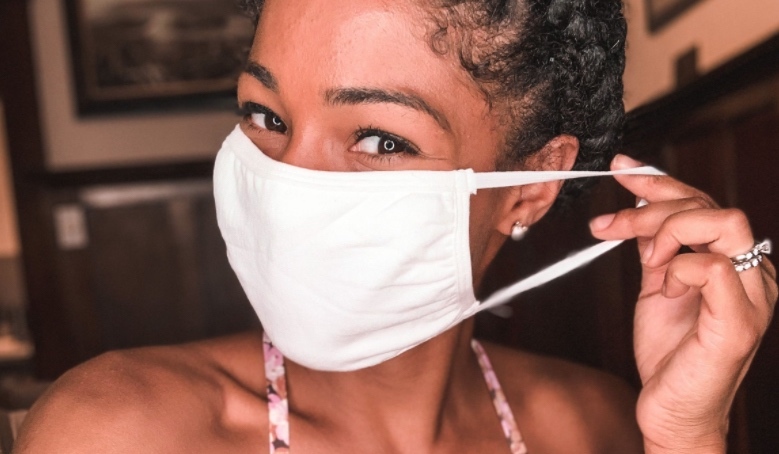
Wearing a face mask can be very uncomfortable, especially for those with acne-prone pare. People with acne-prone skin are at college hazard for breakouts related to the improper use of confront masks. There are many types of masks on the marketplace. Disposable single-use surgical masks, N95 masks, silk masks, stretchable homemade textile masks, and finally, anti-acne face masks.
What are the causes of face mask-induced acne (Maskne)?
Heat, humidity, and a lack of airflow nether near protective face masks create the perfect microenvironment for Maskne to develop. Dry oil and dead skin cells accumulate under face masks, where bacteria and fungi tin can grow and thrive on the skin's surface. The friction of face masks confronting the pare can damage its natural protective layer, allowing the bacteria and fungi to invade the pores and cause acne breakouts. Fortunately, choosing the right type of masks combined with a few unproblematic preventive measures can keep COVID and maskne away.
Is Maskne preventable?
Fortunately, Maskne is very preventable! Wearing the right type of mask, keeping the skin nether the face mask clean and dry will help prevent new acne from forming. It is besides essential to choose a face mask that is suited for acne-decumbent skin.
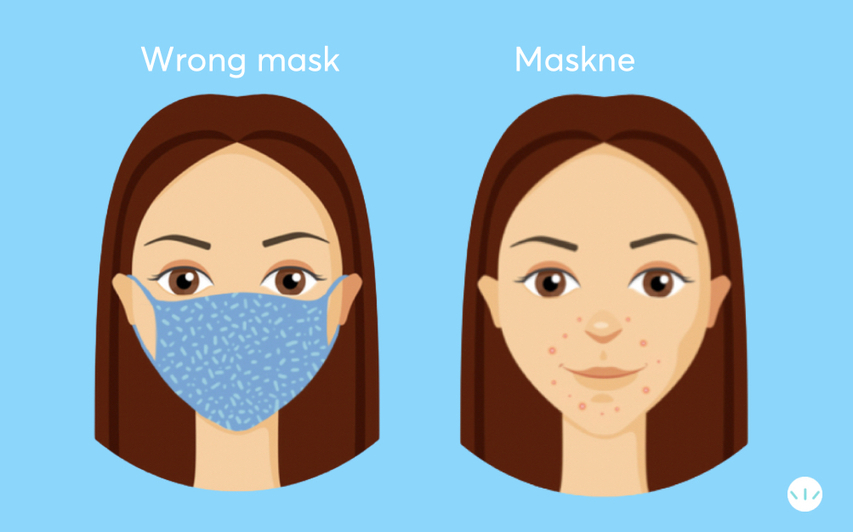
What is the worst type of confront mask for people with acne-prone skin?
The worst masks for acne-prone skin are tight cloth masks made with polyester or other constructed materials, which create hot, boiling environments – perfect for the proliferation of acne-causing leaner (p.acnes); staph aureus, and fungi.
A recent large study on 883 people has looked at the prevalence and skin reactions to the covid face masks. 40.3% wore cloth masks, 57.7% surgical masks, and the rest used surgical masks with cloth covering or N95 masks. 66.9% changed the mask every day, and 33% reported changing the mask only every two-3 days.
The researchers found some agin skin reactions in 54% of the people wearing covid face up masks. Maskne (acne) was noted in 39.9% of people that wore covid masks, followed by a red rash (xv.v%) and itching (15.6%). Rashes behind the ears were constitute in half dozen.7 percentage. Wearing surgical masks showed a significantly college adventure of acne and other adverse skin reactions than a cloth mask. A elapsing of face mask-wearing of more 4 hours per day and the reuse of single-use surgical face masks increased the risk of adverse pare reactions.
Based on these findings, the authors propose that all people, except health workers, should look for cloth masks and avoid unmarried-use surgical masks. Ear savers were reported to assist with preventing friction behind the ears.
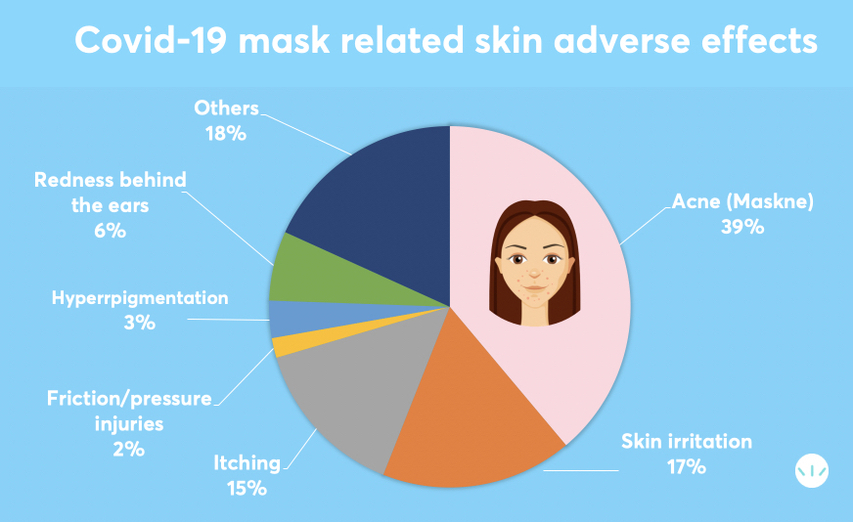
Data source: The Furnishings of the Confront Mask on the Skin Underneath. Periodical of Primary Intendance & Community Wellness Volume 11: i–seven
Do dispensable masks crusade acne?
Yep, they practice! Most single-utilise masks are made of polypropylene, and some are made of other synthetic materials such every bit polystyrene, polycarbonate, polyethylene, or polyester. Polypropylene is a synthetic plastic fabric, close relative to the polyethylene in our trash bags. The manufacturing procedure of those single-apply masks starts with a hot melted plastic that is pressed into shape. It is later cooled downwards, and the straps are welded into place, and the masks are sterilized. This very dumbo synthetic material traps the wet and rut under the mask, creating a perfect breeding surroundings for bacteria and fungi.
In addition to causing more acne, those plastic surgical masks are a severe environmental threat. Polypropylene, the main ingredient of single-use masks, is an oil-derived plastic that takes hundreds of years to break down. Thrown to the ocean, it sheds. Meanwhile, they also dropped tiny harmful microplastic particles consumed by fish and when we eat seafood. Single-use masks are complicated to recycle. Single-utilise masks are produced of a complex blend of synthetic materials that require specific and expensive machinery to recycle. As information technology costs more than to collect, separate, and recycles unmarried-employ masks than the resulting recycled fabric's value, there is no business incentive to recycle those masks.
Tin Disposable N95 professional masks cause acne?
Yes, they do. Unfortunately, the N95 masks are the worst for our skin. Similar to the regular dispensable masks, the N95 respirators are made of multiple layers of polypropylene. This thermoplastic polymer (oftentimes polypropylene) is denser than in a surgical mask, completely blocking airflow. The tight wire effectually the mask causes the mask to exist airtight, increasing the mask'due south heat and humidity. In many people, this wire abrades the skin and causes hard-to-heal friction marks. Having said all that, the N95 should just exist used by medical personnel or people in contact with confirmed COVID patients.
Can silk masks aid with Maskne?
Mulberry silk pillowcases are believed to assistance people with acne on the sides of their faces. Using silk in protective masks volition not help and can even make acne worse. Silk is very smooth and does not absorbs, reducing humidity under the masks. Thus, people with a silk mask will frequently have more than sweat and moisture under the mask than people using natural cotton masks.
What is the all-time blazon of face up mask for people with acne?
The best masks for acne or people with acne-prone peel are natural cotton, breathable masks impregnated with copper and silver particles. These masks harness copper and silver particles' power to impale bacteria, fungi, and viruses on contact. Copper particles have been proven to have antibacterial, antifungal, and antiviral properties. Argent particles take well-documented antiviral, antimicrobial, and antibacterial activeness and, as shown by contempo studies, are constructive confronting other airborne pathogens. Copper and silver fibers are used extensively in hospital bedsheets to fight infections and can also be found in antibacterial and antimicrobial pillowcases to assistance prevent acne breakouts.
What is the all-time blazon of anti-covid confront masks for teenagers?
Confront masks are essential for kids and teenagers. Many of them are not vaccinated and are at risk of getting COVID. Covid is, fortunately, milder in kids and teenagers. Having said, that they do have a hazard of COVID side furnishings, particularly pericarditis. Getting a cotton wool mask impregnated with copper and silverish particle is expected to offer active protection against COVID while keeping the skin acne-complimentary.
What is then unique about MDacne'due south Anti-Acne Confront Mask?
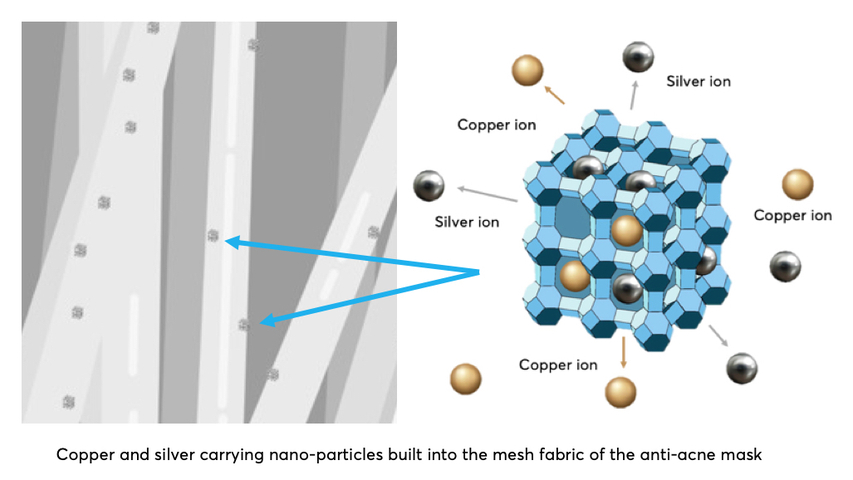
MDacne's copper and silver infused face mask is the world's commencement face mask that can reduce the risk for Maskne. An important characteristic of MDacne's anti-acne mask is that the copper and silver particles are an integral role of all three layers of the mask (not sprayed on the outer surface like some other copper/argent masks). The tedious release of the copper and silvery particles from the MDacne mask provides long-lasting protection, fifty-fifty after washing.
Masks made with natural cotton are ultralight and breathable. Different the single-use surgical masks made of polypropylene and most other cloth masks containing polyester, the MDacne anti-acne mask is non besides tight. It does non rub on the pare, offering a sweat-free, breakout-gratuitous experience.
Multi-layer cotton confront mask vs. disposable surgical mask vs. bootleg masks - filtration power compared:
A recent study from Lake Woods Medical Center tested thirteen different face masks, looking at their ability to filter out particles of 0.3 – 1.0 microns in diameter, the size of many viruses and leaner. Cotton fabric masks with two or more thick cotton layers filtrated 79% of breathable particles than surgical masks that filtrated merely 65% of the particles. The worst performers nosotros single-layer Homemade masks with i% filtration.
How do y'all make clean your protective cloth mask?
For optimal results, reusable protective fabric masks should be washed every 1-2 days. Information technology is recommended to have two masks handy to ensure that a clean i is e'er available to wear. The use of improper cleaning methods can compromise the effectiveness and appearance of protective cloth masks. In some cases, certain detergents can crusade allergic reactions or breakouts, so it's best to look for mild, hypoallergenic, fragrance-free detergents. Good examples are this one and this one.
Washing a protective cloth mask in a washing machine or by hand is both equally constructive. It is essential always to think to utilize hot water to kill the germs. Fortunately, most detergents kill the coronavirus quite hands, then there is no need to apply extra harsh detergents to sanitize the mask.
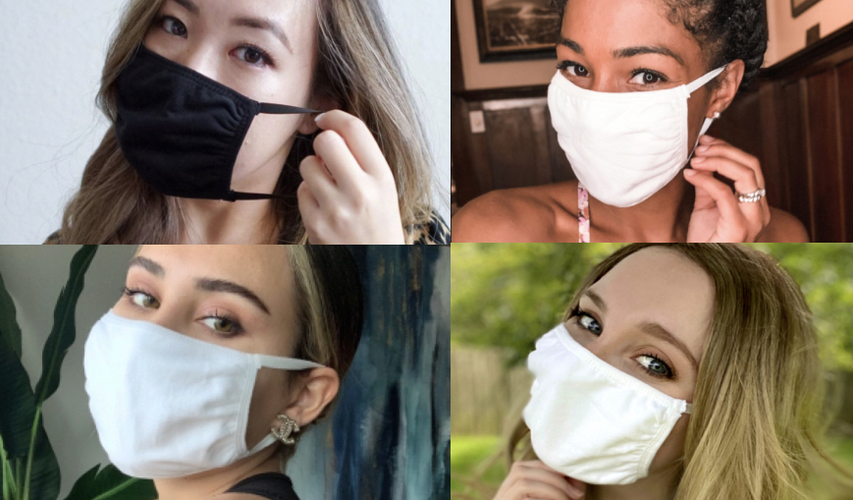
What is the best way to dry a protective mask?
The easiest ways to dry a protective cloth mask are to identify it on a rack in the sun or put it in the dryer on a high rut setting.
More info on Anti-Acne Face Mask
Why you lot need to wear a mask - PBS
To notice the right acne treatments for your unique skin, take the free skin cess by clicking hither.
Source: https://www.mdacne.com/article/best-face-masks-for-people-with-acne-and-acne-prone-skin
Posted by: blanchardmomplary.blogspot.com

0 Response to "Are Face Masks Good For Skin"
Post a Comment